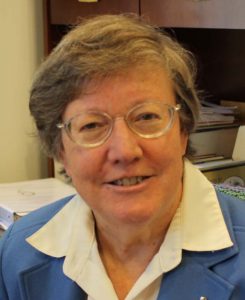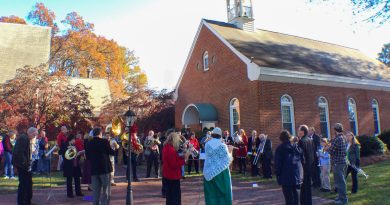I have to love WHOM????
An address to the Southern Province Synod – April 4, 2014
by the Rev. Dr. Nola Reed Knouse
I therefore, the prisoner in the Lord, beg you to lead a life worthy of the calling to which you have been called, with all humility and gentleness, with patience, bearing with one another in love, making every effort to maintain the unity of the Spirit in the bond of peace. There is one body and one Spirit, just as you were called to the one hope of your calling, one faith, one baptism, one God and Father of all, who is above all and through all and in all. (Ephesians 4:1-6)
Out of the 90 words in this short passage, three stand out. They are
- called or calling – appears 4 times: lead a life worthy of the calling to which you have been called; just as you were called to the one hope of your calling.
- one – appears 6 times: one body, one Spirit, one hope, one faith, one baptism, one God and Father of all.
- all – appears 5 times, 4 of them describing the reign of God: one God and Father of all, who is above all and through all and in all; and the 5th reminding us to live with all humility and gentleness.
Imagine if the passage had been written slightly differently, something like this:
I therefore suggest that you lead a life worthy of the purpose which you have chosen, with some humility and gentleness, with patience, tolerating one another in politeness, making some effort to maintain the appearance of unity of the Spirit in the practice of good manners. There is a body and a Spirit, just as you chose some hope of your belief, some faith, baptism, a God and Father of some, who is above most things and through some and in some.
Isn’t that more like the way we live? As if we chose to be in a “group” of like-minded believers? As if we had the right, or even the duty, to exclude or dismiss or turn up our noses or just ignore others who say they are Christians, even Moravians, but who don’t believe exactly what we do? As if God is the God and Father of us and those who think like us, but not of “those people”? As if there really might be faith, and baptism, and a body, and a Spirit, but maybe more than one of each (but of course ours is the right one)?
Brothers and Sisters, that’s not the way it is. That’s not what this Christian life is all about. According to Paul, you didn’t choose to be a member of a group; you were called into a specific calling, to one hope of your calling.
And we as Moravians call one another “sister” and “brother”, as a statement of true relationship, not merely as a nicety or a quaint throwback to our past. In recognizing one another as sister or as brother, we are acknowledging some very important truths, whether or not we’re conscious of it:
First, a brother or a sister is more than a partner, a friend, or a fellow member. Each of those names implies something we can choose. We do not get to choose who is our sister or our brother.
Second, our sisters and brothers are given to us by Christ. Brotherhood and sisterhood are blood ties, not ties of choice, and we are joined together through the blood of Christ.
Third, as we do not choose our brothers and our sisters, we likewise do not have the right to reject one who is a sister or brother. As in a human family, relationships may be strained, or contact may be broken, but that is always a matter for grief; it is always a loss, and our constant prayer should be for reconciliation with our brother or sister. In the body of Christ – the one body – the person is always more important than the specifics of our disagreement. Always.
Also, just as in a human family, our brothers and sisters are different from one another – and from us. This too is part of God’s plan, and a wonderful gift of God’s bounty! Each person in our Moravian family has gifts that were given “to equip the saints for the work of ministry, for building up the body of Christ” (Eph. 4:12) – the one body. To what end? To the end that “all of us come to the unity of the faith and of the knowledge of the Son of God, to maturity, to the measure of the full stature of Christ” (Eph. 4:13).
Remaining in relationship with those who don’t think like us can be difficult. It is altogether too easy to dismiss someone else as “wrong-headed” or “misguided” or some other such label that means we don’t really have to deal with them. We see this every day in the news, in the realm of politics, in the realm of business, in every-day life and too often even in the church. Yet we are called to a higher standard: we are called to “speak the truth in love” so that we may “grow up in every way into him who is the head, into Christ” (v. 15). Paul gives us this charge, impossible though it sounds, and then reminds us how it could indeed be possible: simply because you were called to the one hope of your calling. And God does not call you to something and then fail to give you the needed gifts to live it out.
Love, like faith, is not something we can manufacture. It’s a gift. We cannot make up a warm feeling inside ourselves; however, we can choose to act in a loving manner, over and over, again and again, no matter how hard it is. As we make those choices, over and over and over, we will find that we do truly love. The feeling follows the habit of action. The more you act in a loving way towards another person, the more you will see her as lovable, the more you will find your heart warming towards him with heart-felt love.* This is God’s gift of grace and mercy to us, one of God’s many gifts that enables us to enjoy that abundant life which Jesus Christ promised to his followers.
And the result of this unity, this love, which we can expect from Christ? According to the Ground of the Unity, “how well we accomplish [this unity in Christ] will be a witness to our community as to the validity of our faith.” That means, Sisters and Brothers, that the world will judge us not on how we treat “outsiders” or “seekers” or the “unchurched”, but on how we treat one another. If those outside the church see us bickering and back-biting and dismissing one another as of no importance, why in the world should they come to Jesus? God help us. God help us all.
You have already sung, just now, of the need for love and for God’s help in maintaining more than the appearance of unity. Look at the hymn you sang a few moments ago, the less-than-familiar words[1] that probably tripped you up a bit: You know the verse as this:
And should our love’s union holy firmly linked no more remain,
wait ye at his footstool lowly ‘til he draw it close again.
Well, that’s a sweet thought; but that’s not what Zinzendorf wrote, and that’s not what Paul is advocating, and I firmly believe that’s not really what Jesus is demanding of us. We are called – there’s that word again – simply not to put up with disunity. We are called to drive ourselves in prayer to Jesus ‘til he turns love’s bonds to steel. That image is literally in Zinzendorf’s poem. There’s not just a vague hope that if we sit calmly around things will get better; we are to batter Heaven with our pleading in the expectation – no, the certainty – that Jesus will turn love’s bonds to steel. That the pitiful amount of love we can manufacture will, like the boy’s five loaves and two fishes, be multiplied in the Savior’s hands to an overflowing abundance, far beyond anything we could ask or imagine.
Let us pray, then, that the Savior will turn our love’s bonds into steel, something unbreakable, something far stronger than anything we could make up. Let us pray, each day, each hour, each minute, that each one of us will lead a life worthy of the calling to which we have been called, in the one hope of our calling, one faith, one baptism, one God and Father of all, who is indeed above all and through all and in all. Thanks be to God.
Nola Reed Knouse
April 4, 2014
[1] “And should bond of love which join you lose their strength and prove unreal, drive yourselves in prayer to Jesus till he turns love’s bonds to steel.” More literal translation of verse 2 of Christian Hearts in Love United, hymn 673 in 1995 Moravian Book of Worship.
* This is orthopraxy, or right behavior (as opposed to orthodoxy, right belief. Most denominations emphasize the latter, which is easier to quantify; the Moravian Church has always emphasized right behavior. In education, there is the concept of praxis, learning by doing, which derives from the same root. [Editor’s Note]
The Rev. Nola Reed Knouse, Ph.D., retired as Director of the Moravian Music Foundation, holds degrees from Wake Forest University and the Eastman School of Music of the University of Rochester, with specialization in eighteenth-century German music theory and performance. She also holds the Certificate in Theological Studies from Moravian Theological Seminary and is an ordained Moravian minister.




